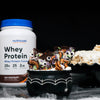Zinc and 3 More Nutrients Your Skin Loves

Imagine you had to wear the same shirt every day for the rest of your life. What would you do? Likely, you’d use the best detergent. You’d take care not to stretch the collar while hanging it up. You might even go so far as to wash it by hand, and you definitely wouldn’t risk wearing it while eating a hotdog.
So why do so many of us neglect to treat our skin with the same level of care? Father Time may be undefeated, but there are ways that we can fight back! Our skin is a lot like us. It’s happy when it’s eating what it likes. In this article, you’ll learn about 4 nutrients to make your skin go “Yummmmm!”

Zinc: Repair and Build!
Zinc is an important nutrient which plays a key role in hundreds of biological processes. Many of these processes involve different types of cellular maintenance. When cells are damaged, zinc teams up with enzymes in your body to stitch them together. It even does this for your DNA!
The last time you got a sunburn, it was because UV rays from the sun killed or damaged the skin cells on your epidermis. Your ability to recover is in part thanks to the zinc in your body. Likewise, zinc plays an important role in repairing all kinds of skin damage, whatever the cause.
In fact, Zinc’s anti-inflammatory properties make it a popular treatment for acne and may even help reduce the appearance of acne scars.
Zinc can be found naturally in red meat and poultry as well as in beans, nuts, whole grains, and many dairy products. And if you’re feeling adventurous, oysters contain more zinc per serving than any other food!
Those who would like to supplement their zinc intake will find that there are many types of zinc supplements on the market to choose from. However, studies suggest that zinc picolinate is the variety which is most easily absorbed into the body.
Vitamin C: Shield Against Damage
Far from being just an excuse to drink orange juice when you’re sick, Vitamin C also makes important contributions to the health of your skin.
Before you rush to rub a lemon on your skin, know that Vitamin C can be unstable and often breaks down and becomes ineffective when exposed to oxygen or sunlight. For this reason, the best topical Vitamin C products often come in air-tight packaging. You may find many of these products labeled as L-ascorbic acid.

Vitamin C is an antioxidant, which means that it neutralizes free radicals and prevents them from damaging your skin cells. Additionally, Vitamin C acts to inhibit the enzyme tyrosinase, which activates as a defense mechanism against UV exposure but can lead to hyperpigmentation, such as sunspots.
Taking Vitamin C orally can enhance the effectiveness of sunscreens by decreasing cell damage. This is, in part, thanks to Vitamin C’s role in collagen production, the protein which is one of the major building blocks of your skin.
Vitamin B: The Groupies
If you’ve spent any time researching skin care products, you’ve likely come across Vitamin B on more than one label. Like many other vitamins, Vitamin B is actually a catch-all term for a group of eight different vitamins.
Of these eight varieties, three have become particularly popular ingredients in many topical creams.
Vitamin B3
Vitamin B3 supports your skin’s natural defenses. Whether applied orally or directly to the skin, Vitamin B3 can help protect your skin against sun damage.
One study involving 386 patients concluded that this protection even extended to reducing the rates of skin cancer in high risk patients.
Vitamin B5
Dry skin? You might want to try Vitamin B5. Sometimes referred to as pantothenic acid, Vitamin B5 is a humectant. When applied to the skin, it attracts moisture from the air, an effect which may aid in hydration, reduce moisture loss, and help those struggling with irritation.
Vitamin B7
Vitamin B7 (also known as biotin) is commonly used by those seeking to give their skin a naturally revitalized appearance.
Vitamin E: Overnight Rejuvenation
You’ve likely heard of Vitamin E because of its popularity as an antioxidant. As with Vitamin C, Vitamin E neutralizes free radicals, stopping them before they can destabilize healthy cells. However, unlike Vitamin C, Vitamin E may be used topically without the risk of breaking down.
Vitamin E also has moisturizing properties and is commonly used as an overnight rejuvenation treatment for tired and worn skin. A quick warning: Vitamin E creams are usually quite thick and can interfere with the application of makeup or other serums. For this reason, it may be best to apply before bed.
Wrapping Up
Your body comes blessed with its own natural skincare routine, but that doesn’t mean you have to let it fight alone!
Team up with your body by giving it what it needs to thrive. The nutrients discussed in this article are only a smart part of the world of skincare. As you explore and learn more, be sure to modify your routine according to what works best for you.
Remember, no one knows your body better than you!
Sources
https://www.health.com/nutrition/zinc-supplement
https://pubmed.ncbi.nlm.nih.gov/3630857/
https://pubmed.ncbi.nlm.nih.gov/18279051/
https://pubchem.ncbi.nlm.nih.gov/compound/Zinc-Picolinate\
https://pubmed.ncbi.nlm.nih.gov/26488693/
https://www.livestrong.com/article/471892-what-is-zinc-picolinate/
-
Posted in
Minerals, Skin Health, Vitamins












